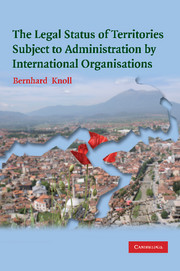Book contents
- Frontmatter
- Contents
- Illustrations
- Foreword: Pierre-Marie Dupuy
- Acknowledgements
- Table of Cases and Judicial Decisions
- List of Abbreviations
- Introduction
- 1 Creation of internationalised territories
- 2 Fiduciary administration: mandates, trust and the transitory sovereignty vacuum
- 3 Self-determination and the personality of internationalised territories
- 4 ‘The King's two bodies’: the dual functions of international administrations
- 5 Extent of UN authority in Kosovo and the problem of an open-ended institution-building mandate
- 6 The status process: Kosovo's endgame
- 7 An anomalous legitimacy cycle
- 8 Properties of a transitory legal order
- Concluding appraisal
- Bibliography
- Index
Introduction
Published online by Cambridge University Press: 11 August 2009
- Frontmatter
- Contents
- Illustrations
- Foreword: Pierre-Marie Dupuy
- Acknowledgements
- Table of Cases and Judicial Decisions
- List of Abbreviations
- Introduction
- 1 Creation of internationalised territories
- 2 Fiduciary administration: mandates, trust and the transitory sovereignty vacuum
- 3 Self-determination and the personality of internationalised territories
- 4 ‘The King's two bodies’: the dual functions of international administrations
- 5 Extent of UN authority in Kosovo and the problem of an open-ended institution-building mandate
- 6 The status process: Kosovo's endgame
- 7 An anomalous legitimacy cycle
- 8 Properties of a transitory legal order
- Concluding appraisal
- Bibliography
- Index
Summary
The United Nations is, for good reasons, reluctant to assume responsibility for maintaining law and order, nor can it impose a new political structure or new state institutions.
What we are involved in is nothing else than building up the whole state from scratch.
The study The Legal Status of Territories Subject to Administration by International Organisations is the result of three years of research at the European University Institute in Florence, including one semester which I spent at Madison Law School. The idea of writing this book was conceived in Prishtina, Kosovo, in the winter of 2001. My daily professional exposure led me to apply to the EUI, thus responding to an urge to reflect more profoundly upon some of the legal implications of ‘political trusteeship’, and particularly on the assumption of temporary imperium over territory by the United Nations. In the hectic environment of the Office of the Chef de Cabinet of the resident OSCE Mission, I came to realise that a background theory for institution-building had to be found somewhere out there. Only a strong conceptual grounding, I believed, could provide a recipe for good practice, whether in Kosovo or in Afghanistan.
Ensuing conversations with friends and colleagues gravitated around some of the concepts that emerge and recur throughout this book: standards, status, sovereignty, representation of territory, self-determination, internationalism, rule of law, legitimacy, fiduciary obligation, sacred trust, accountability, legal personality and so forth.
- Type
- Chapter
- Information
- The Legal Status of Territories Subject to Administration by International Organisations , pp. 1 - 17Publisher: Cambridge University PressPrint publication year: 2008



